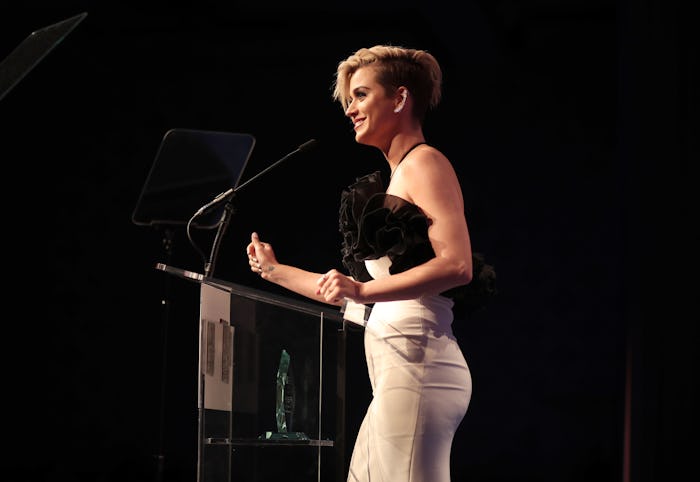Entertainment

Katy Perry's "Jesus Camp" Comments Are So Important
Even though it's been almost 10 years, you likely still remember all the words to Katy Perry's "I Kissed A Girl," and, although you might not admit it, probably still shout them out at the top of your lungs any time you get the chance. It was the song that launched Perry's career in pop music into the stratosphere, and was a drastic shift in tone from her original musical career dabbling in Gospel and Christian pop. From that song forward, Perry soared toward fame with a plethora of equally provocative hits to bolster her record. Surprisingly, Perry was raised in a conservative, Christian household — which makes Perry's recent "Jesus camp" comments so crucial for any young girls who may be in the midst of a similar coming-of-age moment, or women who experienced many of the same restrictive boundaries growing up — women like myself.
Speaking at the Human Rights Campaign gala Saturday night, Perry was transparent in a way she hasn't been before, at least in regard to her past and her upbringing. "I’m just a singer-songwriter honestly," she said. "I speak my truths and I paint my fantasies into these bite-sized pop songs. For instance, ‘I kissed a girl and I liked it.’ Truth be told, I did more than that." Perry went on to talk of her experiences at youth groups, so-called "Jesus camps," and a church that advocated very strong conversion therapy tactics.
Perry was accepting the National Equality Award when she decided to speak up. She confessed that her sexual desires confused her when she was growing up, as they were a direct contradiction to what she was being taught by her two pastor parents:
How was I going to reconcile that with a gospel-singing girl raised in youth groups that were pro-conversion camps? What I did know was I was curious and even then I knew sexuality wasn’t as black and white as this dress.
As anyone who was raised in a conservative, or ultra-religious household knows all too well, the pressures of knowing what is completely "good" and what is outright "bad" can be stifling. As a young woman raised in a small, Texas town, for example, I can attest to being confused by my own sexual desires, heteronormative as they were. My town, church, and school all stressed abstinence, purity, and that girls who wanted to have sex were not good Christian girls. A silver purity ring was the hottest accessory any girl could own. (Remember the Jonas Brothers and their purity ring popularity? It's more common than you think.) But I didn't feel like I fit in, because I didn't understand why sex was so bad, and why my natural desires were considered a "sin" — much in the same way that Perry related in her comments on Saturday.
Perry herself expanded upon those types of confusing experiences, recalling that her own sexuality was groomed by religious standards:
When I was growing up, homosexuality was synonymous with the word "abomination." And hell, a place of gnashing of teeth, continuous burning of skin and probably Mike Pence's ultimate guest list for a barbecue.
Most of my unconscious adolescence, I prayed the gay away at my Jesus camps. But then in the middle of it all, in a twist of events, I found my gift and my gift introduced me to people outside of my bubble.
Unfortunately, Perry isn't alone in that confusion. 30 percent of kids who are gay attempt suicide by the time they're 15. Why? Because so much of society is still so hesitant towards LGBTQ people, their sexuality, and expressions of that sexuality — as well as pervasive attitudes in some communities which equate open sexuality with more destructive crimes. Perry's "I Kissed A Girl," then, surely opened doors for confused kids everywhere, and was, perhaps, one of pop culture's first big push towards more gay-friendly content in the 21st century.
Perry's music and her recent comments speak volumes to young girls everywhere. Because at some point, most girls will become aware of their sexuality, and if they're living in a culture that makes them feel guilty for their bodies' natural desires, that can wreck havoc on their mental health.
But, speaking from a place of experience, if young women are exposed to role models like Perry who work to normalize all kinds of desires, sexual preferences, and discoveries, they might not feel so anxious. They might, despite all of history and culture's attempts to do otherwise, thrive just the way they are, with no shame, no guilt, and no sexism weighing them down.